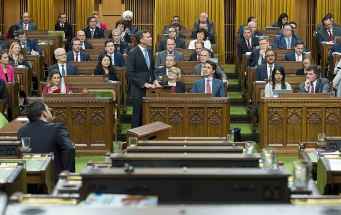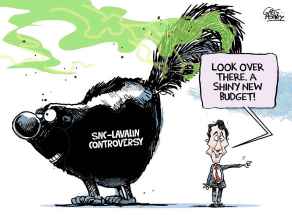City council approves 2019 budget
Read this article for free:
or
Already have an account? Log in here »
To continue reading, please subscribe:
Monthly Digital Subscription
$0 for the first 4 weeks*
- Enjoy unlimited reading on winnipegfreepress.com
- Read the E-Edition, our digital replica newspaper
- Access News Break, our award-winning app
- Play interactive puzzles
*No charge for 4 weeks then price increases to the regular rate of $19.00 plus GST every four weeks. Offer available to new and qualified returning subscribers only. Cancel any time.
Monthly Digital Subscription
$4.75/week*
- Enjoy unlimited reading on winnipegfreepress.com
- Read the E-Edition, our digital replica newspaper
- Access News Break, our award-winning app
- Play interactive puzzles
*Billed as $19 plus GST every four weeks. Cancel any time.
To continue reading, please subscribe:
Add Free Press access to your Brandon Sun subscription for only an additional
$1 for the first 4 weeks*
*Your next subscription payment will increase by $1.00 and you will be charged $16.99 plus GST for four weeks. After four weeks, your payment will increase to $23.99 plus GST every four weeks.
Read unlimited articles for free today:
or
Already have an account? Log in here »
Hey there, time traveller!
This article was published 20/03/2019 (2459 days ago), so information in it may no longer be current.
Winnipeg Mayor Brian Bowman calls the first budget of his second term “a balanced and responsible blueprint” — a sentiment not shared by one-third of city council.
Council approved the 2019 budget Wednesday by a vote of 11-5. The plan consists of a $1.22-billion operating budget that will increase property taxes by 2.33 per cent for the fifth consecutive year, and a capital budget of $367.5 million.

“Each budget year is a challenge, as requests for funds inevitably outstrip the availability of funds,” finance chairman Coun. Scott Gillingham told council as he introduced the budget. “The aim is always to present a responsible budget that funds the services citizens of our great city needs while keeping property taxes, rates and fees affordable.
“Overall, the 2019 budget strikes the balance between discipline, addressing immediate priorities and continuing to invest in key services and infrastructure.”
The operating and capital budgets were largely unchanged from the document tabled March 1 by Gillingham and Bowman.
The only amendment proposed during the meeting came from Couns. Ross Eadie and Jason Schreyer, who advocated borrowing $10 million for local street work — as a partial replacement of the $20-million cut in 2019 as a result of a funding dispute with the provincial government.
The additional borrowing proposal was defeated, 13-3 vote, with Coun. Jeff Browaty joining Eadie and Schreyer in support of the amendment.
How they voted
On the 2019 operating and capital budgets:
In favour — Mayor Brian Bowman and Couns. Matt Allard, Jeff Browaty, Markus Chambers, Scott Gillingham, Cindy Gilroy, Brian Mayes, John Orlikow, Sherri Rollins, Vivian Santos, Devi Sharma
Opposed — Couns. Ross Eadie, Kevin Klein, Janice Lukes, Shawn Nason, Jason Schreye
Coun. Janice Lukes used her time during the debate to criticize the budget process, which involved only nine members of council as members of the working group, and called on the seven other councillors to cast a symbolic vote against the budget.
Couns. Kevin Klein, Shawn Nason, Schreyer and Eadie joined Lukes in protest.
“I didn’t vote against the good things in the budget, but I certainly voted against the lack of long-term thinking that is required to achieve fair city financing of the services we all need for our families,” Eadie said later, in a statement.
While Coun. Vivian Santos voted in favour of the budget, she used her time in the debate to deplore the city’s lack of infrastructure investment in the North End and her Point Douglas ward, explaining more projects are being built in other areas of the city to the detriment of north Winnipeg.
Wednesday also featured an appeal from Chris Lorenc, president of the Manitoba Heavy Construction Association, to temporarily allocate $20 million of the city’s $2.5 billion in anticipated revenues for local street renewals, and then repay that money with the $40 million or more the city will receive from the Canadian government in a bonus gas tax payment (announced in Tuesday’s federal budget).
Gillingham ruled the move out, calling it “premature” to spend money the city hadn’t yet received.
Bowman called the 2019 budget “a balanced and responsible blueprint… A plan that keeps property taxes affordable for Winnipeg families, while maintaining and investing in key infrastructure, services and technology that are important to Winnipeggers and are essential to building our city.”
The mayor later told reporters he would like to spend some of the bonus $40 million from Ottawa on local streets, but said there would be other projects where the funds could be allocated.
Bowman also said it might be difficult or impractical to allocate any part of that money this year, if the funds don’t arrive until May or later.
In a question-and-answer exchange with reporters, the mayor expressed dismay five councillors voted against the budget and its low-income bus pass, freeze on transit fares, and a host of other initiatives.
“Despite some challenges, this year’s budget does a lot of good things for the city.”
aldo.santin@freepress.mb.ca
Highlights of 2019 budget
— Property tax increase of 2.33 per cent (impact on the average home about $40 or a tax bill of $1,733 for a home assessed at $296,560);
— Total spending by the city will climb 3.9 per cent, to $1.22 billion;
— No city staff layoffs;
— Police spending increases 3.4 per cent, to $301.4 million;
— Fire paramedic service spending increases 4.2 per cent, to $201.5 million;
— Business tax rate reduced for the fifth year in a row;
— Freezes on water and sewer rates, transit fares, frontage levies, parking rates;
— No new fees;
— Spending on community centre renovation grants double, to $2 million from $920,000;
— $169 million over six years to reduce incidence of combined sewer overflows;
— $22.2 million for 34 Winnipeg Transit buses;
— $1-million study on electrification of transit buses;
— $18-million savings from vacancy management;
— $12-million savings from department efficiencies.







